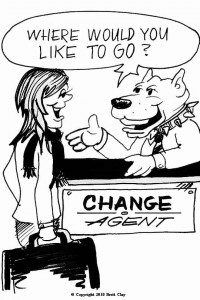This morning I was on a radio show and the host asked me, “What do you mean by change?”
She said, “Everyone talks about change these days. Are you saying the world is changing? Are you saying I have to change as a salesperson? Are you saying my customers have to change?”
The answers are “Yes”, “Yes”, and “Yes”.
Yes, change is a buzz word these days, thanks both to the Obama-for-President campaign and The Great Reboot of 2009, where the reset button was pressed on entire industries. Certainly, the world is changing at an unprecedented pace, right now.
But, change is not new and when people think of change, they usually think about adapting to changes occurring around them. That’s being a slave to change.
Yes, I am proposing that we, as salespeople and executives, have to change: we must adopt a whole new way of thinking—a change-centric way of thinking that sees change not as something that we must adapt to, but something that we can drive to create new opportunities and growth. Rather than seeing problems and solutions, change-centric salespeople and executives see changes and the forces that are driving them. They harness those forces to create new opportunities and grow their business. In other words, they are change masters.
Yes, this also applies to customers. All customers have goals they have not yet achieved. Rather than looking for customers’ problems and pains. Look for the changes that will enable them to achieve their goals. Be a change counselor instead of a solution purveyor and customers will beg you to help them achieve their next goal.
 Real estate is a great example. As the radio show host noted this morning, the environment for real estate sales professionals is changing dramatically. Real estate agents used to view the Multiple Listings Service, then take their clients around viewing homes and facilitate the transaction once the buyer decided upon a house. Now, buyers can not only view multiple listings on agents’ websites, but they can now tour each house “virtually” with 360 degree photos of each room. Real estate agents are also facing enormous competition for listings, driving brokerage firms to add more and more services that enable homes to virtually sell themselves. So, on one hand, the traditional role of the real estate agent to inform the buyer and transact the purchase is diminishing rapidly.
Real estate is a great example. As the radio show host noted this morning, the environment for real estate sales professionals is changing dramatically. Real estate agents used to view the Multiple Listings Service, then take their clients around viewing homes and facilitate the transaction once the buyer decided upon a house. Now, buyers can not only view multiple listings on agents’ websites, but they can now tour each house “virtually” with 360 degree photos of each room. Real estate agents are also facing enormous competition for listings, driving brokerage firms to add more and more services that enable homes to virtually sell themselves. So, on one hand, the traditional role of the real estate agent to inform the buyer and transact the purchase is diminishing rapidly.
On the other hand, selling and buying a home is one of the biggest changes that people make in their lives. Great real estate agents don’t just facilitate the transaction, they facilitate the client’s journey through these enormous changes. They serve as counselors and project managers who help clients figuratively and literally reach new destinations in their life. When they perform as change agents, real estate professionals create value that will not be replaced by websites any time soon.
Yes, that is what I mean by change:
1) Adapting to the new realities of business in a Web-driven, global market place
2) Adopting a change-centric view that creates new opportunities
3) Facilitating clients through changes that deliver them to their destinations
Those sales people and company executives that execute these three principles will be the winners in the new decade.
What is your view? What does “change” mean to you?
Video Blog
[flashvideo file=http://sellingchange.com/video/2-3-10.flv image=http://sellingchange.com/video/2-3-10.gif width=370 height=300 /]



Social